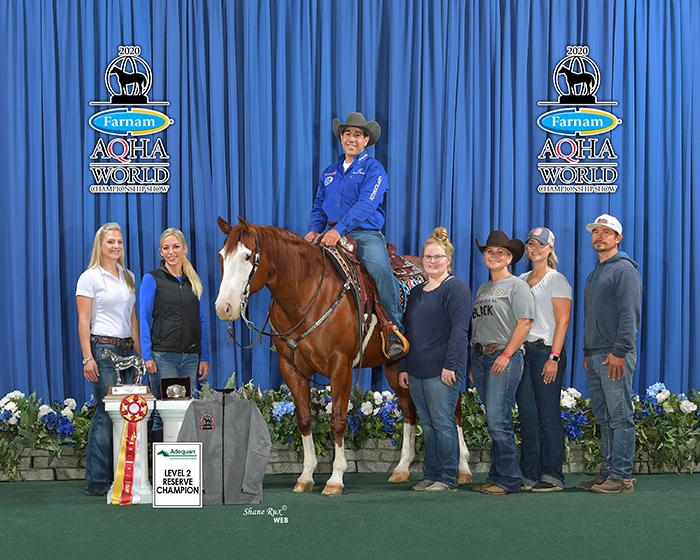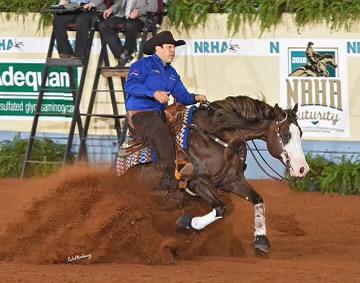Yonathan Baruch

Horsemen and women across the world often give their lives to the pursuit of greatness in the arena. Easter egg hunts with children are often spent with their reining family at the National Reining Breeders Classic; and Thanksgivings are spent at State Fair Park in Oklahoma City at the beginning of the National Reining Horse Association Futurity and Adequan® North American Affiliate Championships. Sleep is lost to midnight preparations for upcoming competitions and birthdays and anniversaries are often celebrated during or deferred until after important shows.
One might ask why trainers would choose a career that requires so much personal sacrifice; isn’t there anything else they can do to make a living? If you ask them, many will admit that horses are all they know, others cannot conceive of working anywhere except on the back of a horse. Many, like NRHA Professional Yonathan Baruch, could have done anything they put their minds to, but it is the passion for the horse and the pursuit of perfection that keeps them hooked.
Baruch was born and raised in Israel to Yudah and Orna Baruch who were both doctors. His sister, Or, and uncle, Amir Yeffet, are mathematicians; as a matter of fact, Yeffet was employed by NASA at one time. To say that becoming a horse trainer was at the top of Yonathan’s list of eligible careers would be erroneous, but the black sheep of the Baruch family was bitten by the horse bug early in life.
Baruch explained his situation, “I was highly ADHD. Back then and even still, it was highly recommended for persons with ADHD to ride horses because anything with a rhythm helps them focus. So my parents, them being doctors and all, said, ‘okay, we’ll give him the best.’ The best opportunity was to go ride a horse. I really got hooked, and I started riding all the time. That’s how it began, at the age of seven, I think.”
Baruch began riding in barrel racing and western pleasure because that was what was most readily available in Israel at that time. His first introduction to reining was through a primordial form of ranch riding. He said, “It was basically the event that came before reining. You had to do some reining maneuvers, and you had to open a gate, and go over poles. It’s very similar to the ranch riding that we have today, but it was still more along the lines of reining. After that, reining came to Israel.”
“There weren’t many riding instructors in Israel,” Baruch continued. “So, at the age of 16, you become a riding instructor. I really liked the competition side of it, and before I knew it, I had 50 kids that I would take to a weekend competition. Over there, you just keep horse hopping, from one class to the next.”

Military Service
In Israel, military service is mandatory; young men serve for three years, and young women, for two years. Yudah, Baruch’s father, was in the Israeli army for 25 years and finished as one of the highest-ranking officers. Driven by a deep desire to give back to the soldiers who had sacrificed so much for his way of life, Yudah was determined to be a combat soldier, but the military grades an incoming soldier’s level of service according to his health, and Yudah was deemed unfit for combat. Undeterred, Yudah signed on as a medic because that would allow him to be positioned wherever he chose.
He served as a part of the land commandos, which is the best unit that Israel has on land. From there, he served as the medical officer of a search and rescue unit. In fact, he was the medical officer for the Israeli troops deployed to Thailand in 2004 to assist after a tsunami struck killing 5,400 people. As a psychiatric specialist, Yudah stayed on after the initial rescue efforts to provide mental support after the disaster.
With such a legacy from his father, Baruch craved his military term. “I always knew that I was going to want to do as much as they let me for the people that sacrificed themselves, so we have a better life and better families,” he said. “Basically, everything that has more risk to it, you have to volunteer for so that’s what I did.”
Baruch knows he wouldn’t be the person that he is today without his time in service. “We are taken from our parents’ houses, our familiar environment, and put into a whole new society where we don’t know anybody. It has nothing to do with the area you came from or the high school you went to. We are put into a system where you just need to work and do a good job. If you don’t, there are repercussions. It gives you responsibility that you have to do whether you like it or not, and you learn that you are going to be okay. That’s the biggest lesson that everybody gets from it.”
Baruch went on to explain how a lot of people from Israel are just not nervous about life anymore. “You learn to get along and work professionally with new people, whether they are your friends or not, so it doesn’t affect your personal life. You learn to just go with the flow. A lot of people will travel the world for a year after their military service. For me, I wanted to see what it is to ride in the U.S., so I got in shape and saved for a couple of years to go,” he explained.
Baruch got back into riding during his last year in the military, starting colts for people on the weekends.
Riding School Instructor
After his military tenure, Baruch managed a riding school that also had a therapeutic component. Because of the lack of therapeutic riding schools in the country, he and the owners had about 100 children partaking in therapeutic riding over the course of the four years he managed it, due to everything from learning disabilities, like Baruch’s, to physical disabilities. In addition to Baruch, there were also two more instructors working with those children, plus four additional instructors managing the regular riding school side. The riding school served about 300 kids in total. It was, in fact, one of the largest riding schools in Israel at the time.
“I showed in the all-around and reining at that moment in time. There wasn’t anyone very proficient in Israel, so every time we would need a judge for a competition, we would bring one from abroad, either from the U.S. or Europe and they would give clinics after the competitions. That’s how we increased our knowledge. I don’t know how good we were, really, but our youth did really well in the Youth World Cups. It seems as though we did teach them well because they were very competitive. A lot of them that were under my guidance at the time finished in the top three when they went to the Youth World Cup, and some of it was even events that we never practiced, like cutting,” he said.

